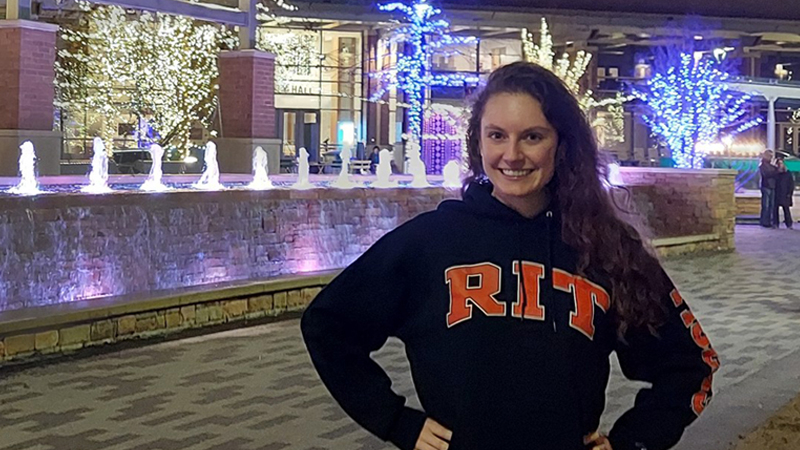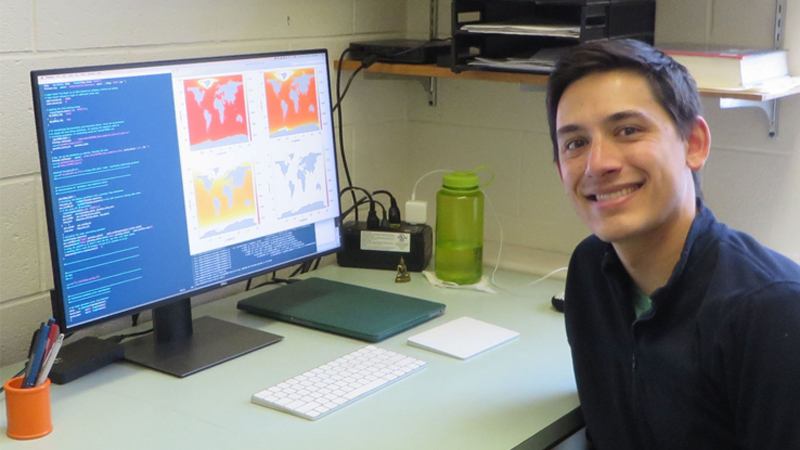Applied and Computational Mathematics Master of Science Degree


Applied and Computational Mathematics
Master of Science Degree
- RIT /
- Rochester Institute of Technology /
- Academics /
- Applied and Computational Mathematics MS
Request Info about graduate study
Visit
Apply
School of Mathematics and Statistics
An applied and computational mathematics master’s degree that is designed for you to create innovative computing solutions, mathematical models, and dynamic systems to solve problems in industries such as engineering, biology, and more.
Overview for Applied and Computational Mathematics MS
Why Study Applied and Computational Mathematics at RIT
- Solution Focused: Apply mathematical models and methods to study various problems that arise in industry and business, with an emphasis on developing computable solutions.
- Diverse Opportunities: Work in areas such as mathematical modeling and analysis of manufacturing, computer and communications systems, transportation optimization, financial mathematics, biological modeling, and consulting/planning.
- Cutting-Edge Research: Current program research includes network science, image analysis, contact lens, polymeric flows, coating, lake plastic, climate modeling, relativity, multi-messenger astrophysics, data analytics, and machine learning.
- Industry Opportunities: Promising Career at Big Companies: Apple, BAE Systems, Ernst & Young, IBM, and Microsoft are just a sampling of employers who hire graduates from our applied mathematics MS.
The applied and computational mathematics master’s degree refines your capabilities in applying mathematical models and methods to study a range of problems, with an emphasis on developing and implementing computing solutions. Sophisticated mathematical tools are increasingly used to solve problems in management science, engineering, biology, financial portfolio planning, facilities planning, control of dynamic systems, and design of composite materials. The goal of RIT’s master's in applied mathematics is to find computing solutions to real-world problems.
Applied and Computational Mathematics
The ideas of applied mathematics pervade several applications in a variety of businesses and industries as well as the government. The reasoning, deduction, and logic skills developed in this program will make you more competitive in a wide array of positions and industries.
Sophisticated mathematical tools are increasingly used to develop new models, modify existing ones, and analyze system performance. This includes applications of mathematics to problems in management science, biology, portfolio planning, facilities planning, control of dynamic systems, and design of composite materials. The goal of this mathematics master's degree is to find computable solutions to real-world problems arising from these types of situations.
RIT’s Master’s in Applied Mathematics
In the applied mathematics master’s you will learn to apply mathematical models and methods to study various problems that arise in industry and business, with an emphasis on developing computable solutions that can be implemented.
Tailor the applied and computational mathematics master’s degree to fit your career goals.
Electives may be selected from the graduate course offerings in the School of Mathematics and Statistics or from other RIT graduate programs, with approval from the graduate program director. You also have the option to complete a thesis, which includes the presentation of original ideas and solutions to a specific mathematical problem. The proposal for the thesis work and the results must be presented and defended before the advisory committee.
Applied Mathematics Careers
Graduates of the masters in applied mathematics are uniquely qualified to address the full breadth of mathematical challenges and have developed a depth of knowledge in their chosen specializations.
The Department of Defense accounts for about 81 percent of the mathematicians employed by the federal government. In the private sector, mathematicians are employed by scientific research and development services, software publishers, insurance companies, and in aerospace or pharmaceutical manufacturing.
Recent applied mathematics graduates are employed as engineers, economists, analysts (e.g. operations research), physicists, cryptanalysts (codes), actuaries, teachers, market researchers, and financial advisors. Apple, BAE Systems, Ernst & Young, IBM, and Microsoft are just a few of the employers who have hired graduates of the applied and computational mathematics program.
Students are also interested in: Applied Statistics MS, Applied Statistics Adv. Cert., Mathematical Modeling Ph.D.
Join us for Fall 2024
Many programs accept applications on a rolling, space-available basis.
30% Tuition Scholarship for NY Residents and Graduates
Now is the perfect time to earn your Master’s degree. If you’re a New York state resident with a bachelor’s degree or have/will graduate from a college or university in New York state, you are eligible to receive a 30% tuition scholarship.
Careers and Experiential Learning
Typical Job Titles
| Network Consulting Engineer | Junior Accountant |
| Data Analyst | Software Engineer |
| Junior Business Analyst | Data Scientist |
| Technical Advisory | Fund Accountant |
| Sr. Project Manager |
Cooperative Education
What makes an RIT science and math education exceptional? It’s the ability to complete science and math co-ops and gain real-world experience that sets you apart. Co-ops in the College of Science include cooperative education and internship experiences in industry and health care settings, as well as research in an academic, industry, or national lab. These are not only possible at RIT, but are passionately encouraged.
What makes an RIT education exceptional? It’s the ability to complete relevant, hands-on career experience. At the graduate level, and paired with an advanced degree, cooperative education and internships give you the unparalleled credentials that truly set you apart. Learn more about graduate co-op and how it provides you with the career experience employers look for in their next top hires.
National Labs Career Events and Recruiting
The Office of Career Services and Cooperative Education offers National Labs and federally-funded Research Centers from all research areas and sponsoring agencies a variety of options to connect with and recruit students. Students connect with employer partners to gather information on their laboratories and explore co-op, internship, research, and full-time opportunities. These national labs focus on scientific discovery, clean energy development, national security, technology advancements, and more. Recruiting events include our university-wide Fall Career Fair, on-campus and virtual interviews, information sessions, 1:1 networking with lab representatives, and a National Labs Resume Book available to all labs.
Featured Profiles
How Mathematicians Move Business Forward
Emily (Kiesel) Wert ’18 (applied & computational mathematics)
Emily (Kiesel) Wert has shown business leaders how valuable mathematicians are on any data analysis and problem-solving team.
RIT Alum Uses Math for NBA Analytics
Calvin Floyd ’17 (applied & computational mathematics)
Calvin Floyd developed the strong technical skills needed to succeed in an NBA analytics department during his masters degree program in applied and computational mathematics at RIT.
Your Partners in Success: Meet Our Faculty, Dr. Wong
Dr. Tony Wong
Mathematics is a powerful tool for answering questions. From mitigating climate risks to splitting the dinner bill, Professor Wong shows students that math is more than just a prerequisite.
Curriculum Update in Process for 2024-2025 for Applied and Computational Mathematics MS
Current Students: See Curriculum Requirements
Applied and Computational Mathematics (thesis option), MS degree, typical course sequence
| Course | Sem. Cr. Hrs. | |
|---|---|---|
| First Year | ||
| Choose three of the following core courses: | 9 | |
| MATH-601 | Methods of Applied Mathematics This course is an introduction to classical techniques used in applied mathematics. Models arising in physics and engineering are introduced. Topics include dimensional analysis, scaling techniques, regular and singular perturbation theory, and calculus of variations. (Prerequisites: MATH-221 and MATH-231 or equivalent courses or students in the ACMTH-MS or MATHML-PHD programs.) Lecture 3 (Spring). |
|
| MATH-602 | Numerical Analysis I This course covers numerical techniques for the solution of nonlinear equations, interpolation, differentiation, integration, and matrix algebra. (Prerequisites: MATH-411 or equivalent course and graduate standing.) Lecture 3 (Fall). |
|
| MATH-605 | Stochastic Processes This course is an introduction to stochastic processes and their various applications. It covers the development of basic properties and applications of Poisson processes and Markov chains in discrete and continuous time. Extensive use is made of conditional probability and conditional expectation. Further topics such as renewal processes, reliability and Brownian motion may be discussed as time allows. (Prerequisites: ((MATH-241 or MATH-241H) and MATH-251) or equivalent courses or graduate standing in ACMTH-MS or MATHML-PHD or APPSTAT-MS programs.) Lecture 3 (Spring). |
|
| MATH-622 | Mathematical Modeling I This course will introduce graduate students to the logical methodology of mathematical modeling. They will learn how to use an application field problem as a standard for defining equations that can be used to solve that problem, how to establish a nested hierarchy of models for an application field problem in order to clarify the problem’s context and facilitate its solution. Students will also learn how mathematical theory, closed-form solutions for special cases, and computational methods should be integrated into the modeling process in order to provide insight into application fields and solutions to particular problems. Students will study principles of model verification and validation, parameter identification and parameter sensitivity and their roles in mathematical modeling. In addition, students will be introduced to particular mathematical models of various types: stochastic models, PDE models, dynamical system models, graph-theoretic models, algebraic models, and perhaps other types of models. They will use these models to exemplify the broad principles and methods that they will learn in this course, and they will use these models to build up a stock of models that they can call upon as examples of good modeling practice. (This course is restricted to students in the ACMTH-MS or MATHML-PHD programs.) Lecture 3 (Fall). |
|
| MATH-645 | Graph Theory This course introduces the fundamental concepts of graph theory. Topics to be studied include graph isomorphism, trees, network flows, connectivity in graphs, matchings, graph colorings, and planar graphs. Applications such as traffic routing and scheduling problems will be considered. (This course is restricted to students with graduate standing in the College of Science or Graduate Computing and Information Sciences.) Lecture 3 (Fall). |
|
| MATH-722 | Mathematical Modeling II This course will continue to expose students to the logical methodology of mathematical modeling. It will also provide them with numerous examples of mathematical models from various fields. (Prerequisite: MATH-622 or equivalent course.) Lecture 3 (Spring). |
|
| MATH-606 | Graduate Seminar I The course prepares students to engage in activities necessary for independent mathematical research and introduces students to a broad range of active interdisciplinary programs related to applied mathematics. (This course is restricted to students in the ACMTH-MS or MATHML-PHD programs.) Lecture 2 (Fall). |
1 |
| MATH-607 | Graduate Seminar II This course is a continuation of Graduate Seminar I. It prepares students to engage in activities necessary for independent mathematical research and introduces them to a broad range of active interdisciplinary programs related to applied mathematics. (Prerequisite: MATH-606 or equivalent course or students in the ACMTH-MS or MATHML-PHD programs.) Lecture 2 (Spring). |
1 |
MATH Graduate Electives |
9 | |
| Second Year | ||
| MATH-790 | Research & Thesis Masters-level research by the candidate on an appropriate topic as arranged between the candidate and the research advisor. (This course is restricted to students in the ACMTH-MS or MATHML-PHD programs.) Thesis (Fall, Spring, Summer). |
7 |
MATH Graduate Elective |
3 | |
| Total Semester Credit Hours | 30 |
|
Applied and Computational Mathematics (project option), MS degree, typical course sequence
| Course | Sem. Cr. Hrs. | |
|---|---|---|
| First Year | ||
| Choose three of the following core courses: | 9 |
|
| MATH-601 | Methods of Applied Mathematics This course is an introduction to classical techniques used in applied mathematics. Models arising in physics and engineering are introduced. Topics include dimensional analysis, scaling techniques, regular and singular perturbation theory, and calculus of variations. (Prerequisites: MATH-221 and MATH-231 or equivalent courses or students in the ACMTH-MS or MATHML-PHD programs.) Lecture 3 (Spring). |
|
| MATH-602 | Numerical Analysis I This course covers numerical techniques for the solution of nonlinear equations, interpolation, differentiation, integration, and matrix algebra. (Prerequisites: MATH-411 or equivalent course and graduate standing.) Lecture 3 (Fall). |
|
| MATH-605 | Stochastic Processes This course is an introduction to stochastic processes and their various applications. It covers the development of basic properties and applications of Poisson processes and Markov chains in discrete and continuous time. Extensive use is made of conditional probability and conditional expectation. Further topics such as renewal processes, reliability and Brownian motion may be discussed as time allows. (Prerequisites: ((MATH-241 or MATH-241H) and MATH-251) or equivalent courses or graduate standing in ACMTH-MS or MATHML-PHD or APPSTAT-MS programs.) Lecture 3 (Spring). |
|
| MATH-622 | Mathematical Modeling I This course will introduce graduate students to the logical methodology of mathematical modeling. They will learn how to use an application field problem as a standard for defining equations that can be used to solve that problem, how to establish a nested hierarchy of models for an application field problem in order to clarify the problem’s context and facilitate its solution. Students will also learn how mathematical theory, closed-form solutions for special cases, and computational methods should be integrated into the modeling process in order to provide insight into application fields and solutions to particular problems. Students will study principles of model verification and validation, parameter identification and parameter sensitivity and their roles in mathematical modeling. In addition, students will be introduced to particular mathematical models of various types: stochastic models, PDE models, dynamical system models, graph-theoretic models, algebraic models, and perhaps other types of models. They will use these models to exemplify the broad principles and methods that they will learn in this course, and they will use these models to build up a stock of models that they can call upon as examples of good modeling practice. (This course is restricted to students in the ACMTH-MS or MATHML-PHD programs.) Lecture 3 (Fall). |
|
| MATH-645 | Graph Theory This course introduces the fundamental concepts of graph theory. Topics to be studied include graph isomorphism, trees, network flows, connectivity in graphs, matchings, graph colorings, and planar graphs. Applications such as traffic routing and scheduling problems will be considered. (This course is restricted to students with graduate standing in the College of Science or Graduate Computing and Information Sciences.) Lecture 3 (Fall). |
|
| MATH-722 | Mathematical Modeling II This course will continue to expose students to the logical methodology of mathematical modeling. It will also provide them with numerous examples of mathematical models from various fields. (Prerequisite: MATH-622 or equivalent course.) Lecture 3 (Spring). |
|
| MATH-606 | Graduate Seminar I The course prepares students to engage in activities necessary for independent mathematical research and introduces students to a broad range of active interdisciplinary programs related to applied mathematics. (This course is restricted to students in the ACMTH-MS or MATHML-PHD programs.) Lecture 2 (Fall). |
1 |
| MATH-607 | Graduate Seminar II This course is a continuation of Graduate Seminar I. It prepares students to engage in activities necessary for independent mathematical research and introduces them to a broad range of active interdisciplinary programs related to applied mathematics. (Prerequisite: MATH-606 or equivalent course or students in the ACMTH-MS or MATHML-PHD programs.) Lecture 2 (Spring). |
1 |
MATH Graduate Electives |
9 | |
| Second Year | ||
| MATH-790 | Research & Thesis Masters-level research by the candidate on an appropriate topic as arranged between the candidate and the research advisor. (This course is restricted to students in the ACMTH-MS or MATHML-PHD programs.) Thesis (Fall, Spring, Summer). |
4 |
MATH Graduate Electives |
6 | |
| Total Semester Credit Hours | 30 |
|
Admissions and Financial Aid
This program is available on-campus only.
| Offered | Admit Term(s) | Application Deadline | STEM Designated |
|---|---|---|---|
| Full‑time | Fall | February 15 priority deadline, rolling thereafter | Yes |
| Part‑time | Fall | Rolling | No |
Full-time study is 9+ semester credit hours. Part-time study is 1‑8 semester credit hours. International students requiring a visa to study at the RIT Rochester campus must study full‑time.
Application Details
To be considered for admission to the Applied and Computational Mathematics MS program, candidates must fulfill the following requirements:
- Complete an online graduate application.
- Submit copies of official transcript(s) (in English) of all previously completed undergraduate and graduate course work, including any transfer credit earned.
- Hold a baccalaureate degree (or US equivalent) from an accredited university or college in mathematics or a related field.
- A recommended minimum cumulative GPA of 3.0 (or equivalent).
- Submit a current resume or curriculum vitae.
- Submit a personal statement of educational objectives.
- Submit two letters of recommendation.
- Entrance exam requirements: None
- Writing samples are optional.
- Submit English language test scores (TOEFL, IELTS, PTE Academic), if required. Details are below.
English Language Test Scores
International applicants whose native language is not English must submit one of the following official English language test scores. Some international applicants may be considered for an English test requirement waiver.
| TOEFL | IELTS | PTE Academic |
|---|---|---|
| 79 | 6.5 | 56 |
International students below the minimum requirement may be considered for conditional admission. Each program requires balanced sub-scores when determining an applicant’s need for additional English language courses.
How to Apply Start or Manage Your Application
Cost and Financial Aid
An RIT graduate degree is an investment with lifelong returns. Graduate tuition varies by degree, the number of credits taken per semester, and delivery method. View the general cost of attendance or estimate the cost of your graduate degree.
A combination of sources can help fund your graduate degree. Learn how to fund your degree
Additional Information
Prerequisites
Applicant must have college-level credit or practical experience in a programming language.
Research
Students in the master's in applied mathematics program are engaged in research projects covering topics that include:
- Bio modeling
- Brain imaging
- Climate modeling
- Cryptography
- Fluid flow
- Machine learning
- Oil recovery
- Plastic pollution
- Relativity
The School of Mathematics and Statistics consistently receives research grant awards from organizations that include the National Science Foundation, National Institutes of Health, and NASA, which provide you with unique opportunities to conduct cutting-edge research with our faculty members. Faculty in the School of Mathematics and Statistics conducts research on a broad variety of topics including:
- applied inverse problems and optimization
- applied statistics and data analytics
- biomedical mathematics
- discrete mathematics
- dynamical systems and fluid dynamics
- geometry, relativity, and gravitation
- mathematics of earth and environment systems
- multi-messenger and multi-wavelength astrophysics
Learn more by exploring the school's mathematics research areas.
Latest News
-
February 22, 2024
![an arial photo of the amazon shows a large amount of deforestation]()
RIT researchers highlight the changing connectivity of the Amazon rainforest to global climate
The Amazon rainforest is a unique region where climatologists have studied the effects of warming and deforestation for decades. With the global climate crisis becoming more evident, a new study is linking the Amazon to climate change around the rest of the world.
-
April 3, 2023
![Person using a touch screen computer.]()
RIT Master Plan gives graduate tuition scholarship to eligible alumni
RIT is offering a graduate tuition scholarship to recent alumni seeking to expand their career potential through the university’s graduate programs. Alumni can enhance their skill set for the new economy through master’s degrees that build upon collaboration, analytical thinking, complex problem solving, and flexibility.
-
March 21, 2022
![two students working in a room surrounded by orange windows.]()
RIT Master Plan cuts tuition in half for eligible alumni
RIT is extending a special graduate tuition scholarship program to recent alumni as the COVID-19 pandemic enters its third year. The program helps alumni who graduated during the pandemic enhance their skill set for the new economy through master’s degrees that build upon collaboration, analytical thinking, complex problem solving, and flexibility.























